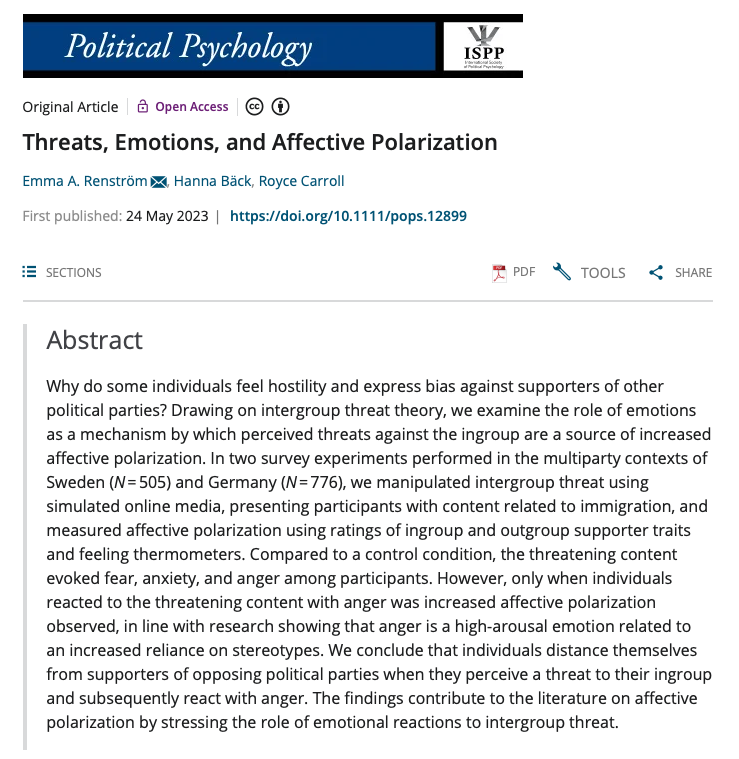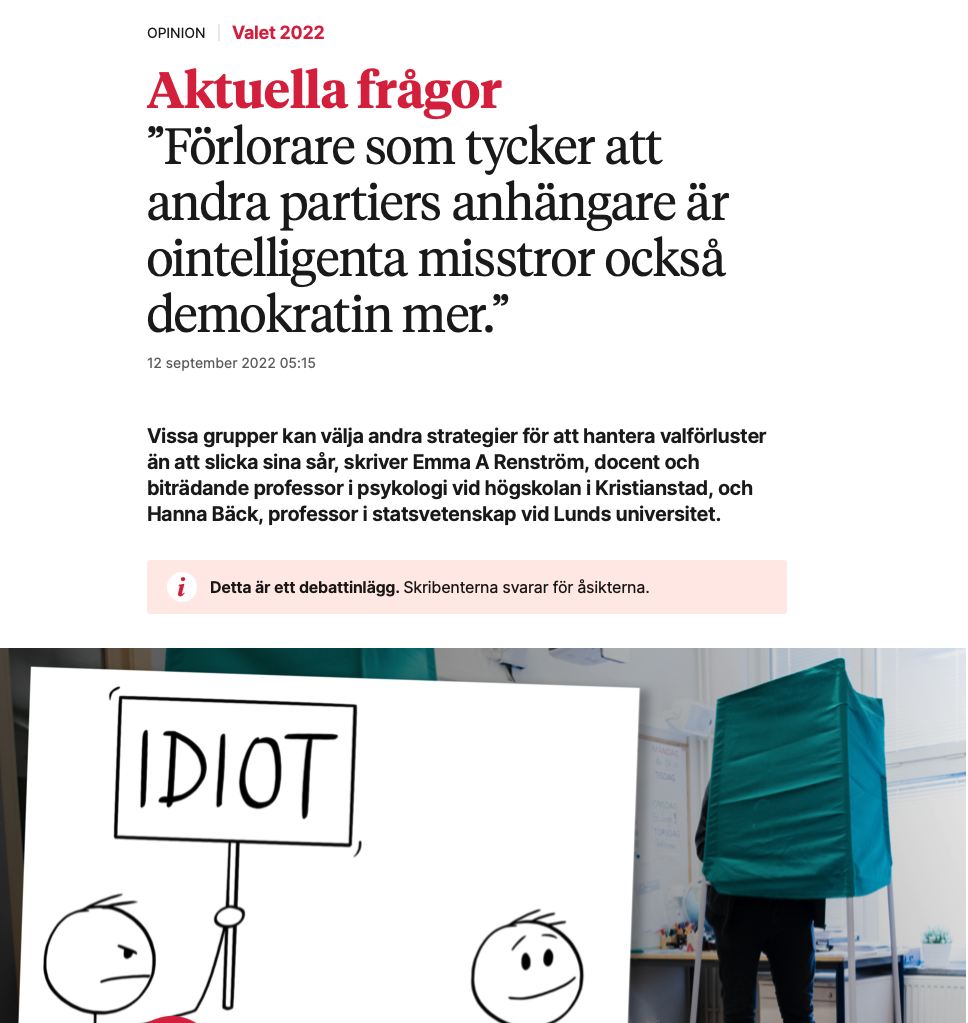The article can be found here.
New postdoc
Alexander Ryan is a new postdoctoral fellow in the project “Polarizing pandemics. Identity, emotions, and attitudes toward Covid-19 prevention”. Alexander acquired his PhD in political science from Mid Sweden University in 2023. His dissertation centers on affective political polarization in the Nordic region, including how to measure and study the concept in multiparty contexts, examining explanations for differences in affective polarization and studying its political consequences. His work has appeared in journals such as Scandinavian Political Studies and Frontiers in Political Science.
New book out: "Coalition Agreements as Control Devices - Coalition Governance in Western and Eastern Europe"
Research team member Hanna Bäck co-authored a book in comparative politics that was published just a few days ago! Together with Heike Klüver and Svenja Krauss she has analysed the content of coalition agreements across a range of parliamentary democracies in Western and Eastern Europe.
The book is the first of its kind and it provides imperative insights as to how coalition agreements actually work. I.e., how coalition parties use negotiations to control their coalition partners when policiy issues are divisive and important or when confronting a hostile minister. Order your very own hard copy of the book here.
Member of the Royal Swedish Academy of Letters
Hanna was recently elected a new member of the Royal Swedish Academy of Letters. Queen Lovisa Ulrika founded Kongl. Swenska Witterhets Academien, the Royal Swedish Academy of Letters on 20 March 1753. Today, as the Royal Swedish Academy of Letters, History and Antiquities, the Academy advances and funds research in the humanities and social sciences and in cultural heritage management. Its work is financed by donations and by public and private foundations.
Read more in the press release (in Swedish).
Social dominance orientation and the moderating role of being single on misogynistic attitudes
A new article was recently published, exploring the role of entitlement, SDO, RWA and being single on misogynistic attitudes among American heterosexual men. The article can be found here.
Abstract
This article aimed to explore individual level factors as predictors of misogynistic attitudes. Given that misogyny and activity on online forums related to so called incel-dom is growing and has been identified as a terrorist threat, it becomes important to better understand the underpinnings of misogynistic attitudes, also in a normal population. Based on previous research and theory, entitlement, Social Dominance Orientation and Right-wing authoritarianism was explored as well as the moderating role of being single among American men (N = 302). Results from an online survey showed that all three predictors as well as being single (compared to being in a relationship) significantly predicted misogynistic attitudes. The effect of SDO was moderated by relationship status such that singles who were high SDO expressed most misogyny. The results contribute to a better understanding of who may come to adhere to a more radical view of women.
New research assistant
We have hired a new research assistant, Maya. Maya will mainly work with the incel project but also with the other projects.
Maya has a MSc in applied social psychology from Groningen University, The Netherlands. Her main area of interest lies within social and cultural dynamics. More specifically, she has studied social grounding, and how social norms are formed and maintained regarding sexual behavior and beliefs. Additionally, she is interested in group polarization and radicalization processes, and aims to clarify why some people come to hold extremist and hostile views about certain matters or other people.
Top cited article!
Great news to see that one of our papers on Covid and emotions were top cited according to Wiley!
We are hiring!
We are currently looking for a research assistant to our new project about Incels and misogynistic radicalization. If you are interested, or know someone who is, do not hesitate to apply/pass on the information. Note however, that Swedish is a pre-condition.
Apply here!
Two large grants awarded to the research group
The research group recently was awarded with two large research grants.
The first “Incels and the manosphere” will explore the incel movement and misogynistic radicalization in Sweden. The grant was awarded by Forte, for three years.
The second “A divided digitalized democracy” will explore affective polarization as a spiral between the political elite and the masses. This grant was afforded by Vetenskapsrådet, for three years.
New paper on radicalization
Holly, Emma and Magnus just published a new paper on radicalization in the backdrop of the abortion divide in the US. The paper titled The abortion divide: Exploring the role of exclusion, loss of significance and identity in the radicalization process was published in Frontiers and can be found here.
Abstract
Introduction: Recently, the abortion issue has entered the spotlight in the USA, leading to potential radical actions. As the majority opinion on the abortion issue vary with state, some individuals will be in the numerical minority within their state, possibly evoking feelings of exclusion. Social exclusion can motivate a radicalization process. The aim of this paper is to explore how individuals in a numerical minority experience feelings of exclusion and significance loss and how this may drive radicalization in the context of the abortion issue.
Methods: A quasi-experimental design was used and 534 respondents from naturally occurring numerical minority and majority groups based on state abortion opinion participated in an online survey.
Results: Results showed that those in the numerical minority experienced exclusion and were more willing to engage in and endorse radical actions compared to those in the majority, regardless of position on the abortion issue. Serial mediation analysis revealed that the pathway between minority group status and engagement and endorsement of extreme actions was fully mediated by need-threat and ingroup identity.
Discussion: Being in the numerical minority is associated with feelings of social exclusion, which may trigger a radicalization process. The results advance our understanding of when and who is vulnerable to radicalization and that social structures that perpetuate marginalization and inequality may contribute to radicalization. Results highlight the need to continue to explore radicalization from a group-based perspective and emphasize exploring mediating factors as a pathway from social experiences to willingness to engage with radical groups.
Debate article in relation to the Swedish Election
Yesterday was the Swedish election. Hanna and Emma was asked to write a debate article about affective polarization in relation to elections by the Swedish newspaper Sydsvenskan. The article is found here.
Hanna interviewed about potential effects of affective polarization on government formation (in Swedish)
Med en dryg vecka kvar till valet är tonläget i politiken högt och polariseringen tydlig. Men skiljaktigheterna handlar inte bara om ideologi och åsikter. Man är också benägen att tycka att motståndarna är oärliga, ointelligenta och fördomsfulla. Det visar forskare vid Lunds och Göteborgs universitet i en studie om så kallad affektiv polarisering.
Läs hela inlägget från Lunds universitets hemsida här.
New blog post about affective polarization (in Swedish)
Hanna och Emma har skrivit ett blogg-inlägg på Makt och Politik om affektiv polarisering.
Valrörelsen är i full gång och partiernas representanter uttalar sig i mer eller mindre negativa ordalag om motståndarsidan och utmålar vissa andra partier som fiender. Detta kan ha stor betydelse för hur väljarna ser på andra partier och deras anhängare, och för den så kallade polariseringen i väljarkåren.
Chapter in new Oxford Handbook
Emma and Hanna has contributed with a chapter in the new Oxford Handbook on Political Participation. The chapter specifically concerns political psychology and political participation.
Sympathizing With the Radical Right: Effects of Mainstream Party Recognition and Control of Prejudice
A new paper in the Journal of Social and Political Psychology about how mainstream party recognition increase sympathy for the radical right.
The electoral success of radical right parties throughout Western Europe is the biggest change to these formerly stable party systems. Several studies have identified that mainstream parties can shape the trajectory of radical right parties. Our aim is to contribute to this literature, and to investigate if and how radical right parties gain from mainstream party recognition. Theoretically, we draw on the literature that has suggested that when aiming to explain the legitimization of radical right parties, we need to consider that many individuals in Western Europe are influenced by an anti-prejudice norm when forming preferences towards such parties. We hypothesize that when mainstream parties signal that it is acceptable to associate with radical right parties' they challenge the anti-prejudice norm that dissuade voters from such parties. In addition, individuals with lower internal motivation to control prejudice (IMCP) are more susceptible to be affected by mainstream party recognition of radical right parties as those with high IMCP have a stronger internalized anti-prejudice norm. We evaluate the effects of changes in the normative context in a survey experiment (N = 1133) by manipulating mainstream party legitimization of a radical right party, the Sweden Democrats, before the Swedish parliamentary election in 2018. Our results suggest that when mainstream parties challenge the anti-prejudice norm, individuals are more likely to sympathize with radical right parties. Moreover, the effect of mainstream party recognition is moderated by IMCP-individuals with a low motivation to appear non-prejudiced are more influenced by mainstream party legitimization of a radical right party.
The article can be found here.
Protecting the Ingroup? Authoritarianism, Immigration Attitudes, and Affective Polarization
A new paper on the effects of RWA on affective polarization is out in Journal of Social and Political Psychology.
What makes people affectively polarized? Affective polarization is based on the idea that partisanship can be a social identity leading to polarization in the form of intergroup distancing between the own party and the other parties. In this study, we argue that perceived threats from an outgroup can spur affective polarization. To investigate this, we use the issue of immigration, often framed as a threat by right-wing groups, to examine whether individual-level differences influence how sensititivity to the perception of immigration as a threat. One such factor is the trait right-wing authoritarianism (RWA), which is characterized by emphasis on submission to authority and upholding norms of social order. The emphasis among individuals with this trait on protecting the ingroup from threats means that negativity toward immigration is likely to extend toward political opponents, resulting in an increase in affective polarization. Thus, we hypothesize that the affective polarization is likely to increase when individuals interpret immigration as threatening, particularly for the individuals who are high in RWA aggression. We evaluate and find support for this claim using a large-scale survey performed in Sweden ( N = 898). The results, showing a conditional effect of immigration attitudes on affective polarization, are consistent across three commonly used measures of affective polarization as follows: trait ratings, a social distance measure, and feeling thermometers. Overall, our results show that it is important to consider intergroup threats and intergroup differences in the context of sensitivity to such threats when explaining affective polarization.
The paper can be found here.
University Day
As a fairly recently hired associate professor, Emma was presented on the University Day at Kristianstad University. Here she is talking about our research on affective polarization with the head of the University.
Student thesis on misogynistic radicalization
Kim Holm and Matilda Plume, clinical psychologist program at the University of Gothenburg, has written a thesis on misogynistic radicalization with Emma as supervisor. The thesis is entitled: Misogynistic radicalization on the Manosphere – exploring the effects of entitlement and negative emotions can be downloaded here.
Abstract
During the last decade the online milieu known as the manosphere has been connected to numerous lethal deeds and acts of violence against women. The overarching purpose of this study was to gain a deepened understanding of the processes of online misogynistic radicalization. Drawing on theories on radicalization, masculinity, and the effects of emotions, we designed and conducted an online survey-based experiment to examine how average men can become misogynistically radicalized towards using or condoning violence. The experiment randomly assigned 596 American men to read fictional tweets designed to either threaten their masculine social identity or to be non-threatening. We used a model of moderated mediation, with entitlement as a moderator and negative emotions as mediators between the threat condition and measures of misogynistic radicalization. Our results showed that threatening messages increased negative emotions. Specific emotions had unique effects, with disgust and fear increasing measures of radicalization. Additionally, the effects of disgust on radicalization were moderated by degree of entitlement. Our results provide experimental evidence for processes of misogynistic radicalization occurring online, and its relevance to the general radicalization research field is discussed.
Interview in the magazine Expo
Emma was recently interviewed in the magazine Expo talking about our recent results on perceptions of threat and affective polarization.
Our research featured in The Guardian
Our research on radicalization was referred to in the Guardian. The article is found here.













